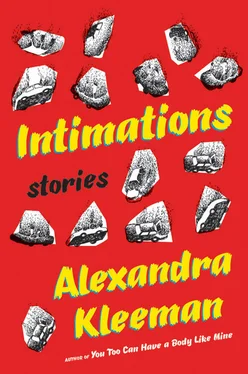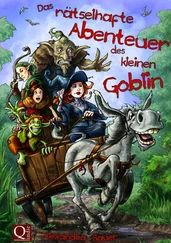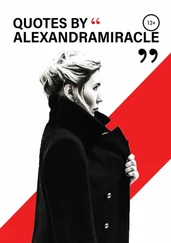As she rounded the corner to the block where she would find the café, Karen saw that something had gone on. In the vivid blue dusk, swaths of a brighter blue alternated with hot red, electrifying the trunks of trees and sides of buildings. A few people milled around, talking; others walked past as though everything were just as it should be. With a terrifying expression on her face, Karen ran with the ugly stroller, her feet festooned with Band-Aids, toward police cars up ahead.
As she came close, she saw, first, a policewoman with a short blond ponytail, then her partner, who had a notepad, and then a potbellied man explaining something to him with vigorous gestures. She saw the vehicles double-parked by the entrance to the café where the lights were on and the barista slid a rag along the counter. There was no sign of Linda, or of her garish pinks and greens: Linda was gone. The light was ending. And then, in the arms of a policeman, standing in the yellow sheet of light cast by the streetlamp that had just come on, she saw Lila, she saw her baby. She squirmed gently, held by a stranger. Linda had left her there, gone about her own business. With a shudder, Karen thought of the stranger’s hands, the strange hot arms.
Inside the baby, something was taking shape. There were colors and planes, indistinct, as if viewed through a thick layer of water. There was dimness and cold, the unmoored perception of bright blue and red, flashing. The baby watched as her mother came toward her with a face full of terror. The two eyes large and wild, the mouth pouring. With her gentle mind, the baby took the face in and waited, waited as it sank slowly to the top of a pile of things without names, waited for the noisy world to become still once more. It was all collecting inside there, gathering like dust, building, building up, until someday there would be enough for some part to pierce the surface of her silence and gasp out a piece of what lay beneath.
She was truly happy for the first time in her life, and it felt just like living in a small room painted all white, with windows looking out onto impenetrable forest. It didn’t bother her when she had to walk past strangers unwashed in the middle of the day or when she forgot a newly bought bag of groceries on the subway seat. Crossing the street, she paused to look up at an airplane etching a thin white stroke in the sky and was nearly hit by a taxi. Though it had been over a year, she staggered through the world like one freshly bludgeoned by love.
Now they were at a resort hotel by the beach, though the beach was really a five-minute drive away. All they had here was a forty-foot strip of damp sand visible during lowest tide, and a staircase that led directly into the sea. Karen looked down at the blue water frothing against the last visible stair. The water had a mouthwash color, something usually achieved through dye, making everything look unreal, retouched, staged somehow. Seeing her own hands foregrounded against this blue filled her with the sensation of dreaming, in the moments just before you wake up. Off in the far distance fishing boats floated at the horizon line, the only indication that this country had a real economy of its own, separate from the all-inclusive resorts that lined this stretch of land, which resembled utopian communes but operated secretly under cutthroat capitalist principles.
The water was cool, and looked as clear as a glass of water: you could see shells strewn on the ocean floor. But the unusually hot weather had caused jellyfish to multiply unchecked. They populated the shallows, a slight distortion in the shifting, flashing patterns of sunlight on sand. Beachgoers descended the staircase to steep their bodies in the tropical blue, but once they got out into the sea they stopped, looking down and moving around nervously, a few steps to the left, then to the right. One woman was stuck in waist-deep water, crying, her face deeply pink. She kept wiping it with short, rough motions that looked like slaps. Over and over she turned back toward the staircase, but she was too far away. The man she had come with was several feet away, doing the breaststroke in tight circles. “You have to kick their heads,” he shouted to her. “Kick them out of your way!”
Daniel had proposed to her that morning and she said yes in an instant. He went to take a shower. Karen had left the bungalow, identical to every other in the resort, and walked out into the swelter. It seemed strange to be apart from him in this moment, but it felt even stranger to wait for him there in the overly cold hotel room, trying vaguely to read a magazine while he washed each part of his body with scrupulous care. She expected the world to feel different now that she had achieved a new life state. Instead, it was deathly hot. Karen walked out to the railing and stared down into the sea. It looked beautiful enough, but the water was haunted. If you waited patiently and let your eyes adjust, it would come into focus: the faint pale outline of a jellyfish, like a ghost of the jellyfish you had seen on TV or in photographs, a bland white space waiting to be colored in.
“She stood there wailing. Every few minutes it got louder, then she’d shout out ‘I’m so scared!’ or ‘They’re everywhere!’ He just swam around. At the end he picked her up and carried her out.”
“I love how easy it is to pick people up when you’re in the water,” Dan said, tilting a small full glass of orange juice into his throat.
“What?” Karen asked.
“That’s what we used to do when we went on family vacation. Once I was a teenager, my dad used to let me pick him up and carry him around the pool. He was a big guy then, that’s when he was still training for marathons. It was hard to do, but it was still possible.” Dan smiled and stabbed at his breakfast sausage. He had chosen this resort for its high ratings on decor.
“That sounds nice,” Karen said, uncertain. Dan’s plate contained a horrifying amount of meat from all different cultures and civilizations.
“It was nice. My mom would bring us all virgin daiquiris from the bar and we’d pretend they were getting us drunk. My dad and I would use them like lances and try to joust in the water.”
“Daiquiris?” Karen asked, trying to picture it, the novelty straw pointed outward, weaponized.
“No,” said Dan, “my mom and sister. They tried to make themselves perfectly rigid and narrow at the tip.”
“Oh, I see,” said Karen. Karen had never heard of a happy childhood like Dan’s from any real person, but she had seen things like it on TV screens. When he told her about the sunny, lively experiences of his past, she often thought of them as synopses or, if there were many, montage. She tried to ask the questions that would make these stories take on mass. Was this while his mother was working in prison law, trying to stop the construction of new facilities? Were his lawyer parents troubled by their work, did it make his childhood less bright? Did his father regret training so hard when it was a marathon that had blown out his knee? She looked out the restaurant window at the perfect blue water full of stinging tentacles, then at the resort-goers crowding the omelet bar, several of them calling out their orders at once. Behind the counter, a boy no older than sixteen regarded the ingredients with terror as he cracked two eggs into a small white bowl. Karen prayed that he would not do something tragic like try to escape.
“The worst part of it,” said Karen thoughtfully, “was how happy he was. I watched him paddle around, do handstands, splash in the water, while she wept twenty feet away. He might as well have been whistling jauntily.”
“Who?” Dan asked, looking up.
“Nothing,” she said.
Читать дальше












